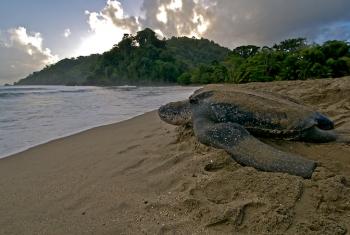Animal Viewing - Turtle Sighting

Responsible tourism for turtle sighting has brought great benefits for their conversation and the development of local communities. Turtle populations suffered a significant decline due to loss of habitants and indiscriminate capture. However, in recent years there has been a recovery in the case of seven marine species.
We cannot forget though, that on many occasions these type of activities are carried out by groups of tourist who are improperly informed and who do not respect animals’ behaviour. That’s why you should make sure of the ethics and practices of your operator before hiring the activity. Here you can check a list with some of the organizations that operate in Latin America, the place with the highest tourist activity for turtle sighting.
In all cases, both in water and on land, you must fulfil the following recommendations that you can check in full here:
Sightseeing in the water
Whether sailing, snorkelling or scuba diving, we can come in contact with turtles. In this case, in order to respect and protect the animals and their natural environment, their feeding and resting areas we must consider the following:
- Approach slowly and silently, without chasing or harassing them, always keeping a minimum distance of 6 meters.
- Do not touch, follow or chase them.
- If in a group, do not surround them and always leave them a way out to escape.
Also allow them to emerge from the water to breathe, otherwise they could die. - Swim away if the animal looks stressed or agitated
- Do not feed them. They are herbivore and an inadequate diet can affect their health. They could also become used to looking for food near boats and this could cause collisions and their death. If they become accustomed to eating fish they may end up swallowing hooks which can cause irreparable damage.
- Do not leave garbage behind and pick up any you may find –turtles may confuse plastic bags with jellyfish and die from ingestion.
- In case of going by boat, reduce speed when approaching to not hurt or kill them. The use of buoys is recommended to avoid anchoring on coral or seagrasses (main source of food for turtles).
Beach sighting
The time of the year when turtles return to the beaches to spawn has become a very popular tourist attraction and it has led to large crowds of people attending to the lay and hatch of eggs. Despite being faced with an experience that is lived with great emotion, closeness and empathy, witnessing such a crucial moment should not interfere with the natural behavior of turtles, since stress can cause the reproductive moment to fail. Therefore, remember the following points:
- Keep noise and movement low with a minimum distance of 20 meters from the animals.
- Do not touch, harass or ride on the turtles.
- Do not use flash as it can dazzle and disorientate the turtles. For flashlights make sure they have red LED lights or special filters and always light from behind.
- Try to wear light-coloured clothing.
- Do not smoke and never leave any garbage, whether it is your own or not.
- When hatchlings hatch do not use flashlights as they can become disoriented and die of dehydration, do not touch or disturb the hatchlings and never carry them directly into the water (they could become disoriented).
If you are staying at a facility near a beach where turtles lay their eggs: remove all hammocks, as the turtles could get caught in them, turn off all lights outside and draw the curtains in the room so that the light is not seen from outside.
If you find yourself on a beach where there are or may be turtle eggs, you must be careful not to destroy them so do not build fires, drive on the sand, be careful if you put up an umbrella, do not build castles in the sand or let the dogs go loose. When walking on the beach, try to walk at the water's edge, especially avoiding the dunes.
Turtles also face other dangers such as exploitation in the so-called turtle farms. Visit our section to make sure you visit a centre with a legitimate purpose and not just another business at the expense of the animals. There is also a trade in souvenirs made from the skin or shell of the turtles. See our recommendations to avoid products obtained from these and other animals.
